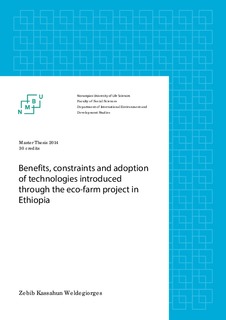| dc.description.abstract | In Ethiopia, uptake of new technology is low despite the fact that technology adoption has a direct impact on crop yield and household’s income generation as well as increased nutrition level. The purpose of this study was to investigate the extent of adoption of introduced technologies. Improved crop varieties, fruit and fodder trees and soil management technologies were among the introduced technologies. The study was carried out in three districts namely: Adami Tulu Judo Kombolcha (ATJK), Mekhone and Tach- Armacheho respectively. Empirical data were collected from 102 farmers via questionnaires and focus group discussion. Among the respondent farmers, 83.8, 30.3, and 10 percent of the farmers in ATJK, Mekhone and Tach-Armacheho districts respectively were adopters of more than four introduced technologies. The majority of the farmers (84.4%) in Adami Tulu Judo Kombolcha (ATJK) district adopted maize varieties. Yield increases were more pronounced in maize than in sorghum. The new maize varieties were resistant to pests and diseases which partly explain why they were well received. In Tach-Armacho district the most technology was upland rice which was adopted by 67% of the households. Rice proved to be very economical and highly beneficial for farmers with extended family members. This was a new crop in this area. The most adopted technologies in in Mekhone district were dairy goat production which was adopted by 27.3% of the sampled families. Characteristics of a technology such as: simplicity, visibility of results, usefulness towards meeting an existing need and low capital investment promoted their adoption. Their choice to adopt is affected by profitability and an- inter related series of personal, cultural, social and institutional factors. Factors that limited the uptake of new technologies included lack of persistent rainfall, lack of education and risk aversion behaviour. As a result, to encourage the expansion of adoption in Ethiopia, it is essential to take into account the factors that influence farmers’ adoption decision. | nb_NO |
